 Artificial intelligence has been applied to just about every supply chain application imaginable, including transportation management and execution, demand planning, supply chain planning, warehouse management, and order management. It has also been embedded in autonomous trucks, robots, and drones for navigation. There are myriad applications outside of the supply chain world as well. A few years ago, I wrote about using AI for writing a Metallica song. Satirist Funk Turkey used lyrics.rip to scrape the Genius Lyrics Database and made a Markov Chain write Metallica lyrics. He then wrote the music, recorded, and mixed it in his house. I’ve now seen a new trend around using AI for music: illustrating song lyrics. One such YouTube channel is ARTificial Video, which uses midjourney.com, an independent research lab exploring new mediums of thought and expanding the imaginative powers of the human species, to create illustrations for every lyric of a song. It is truly fascinating and makes for some interesting videos. And now on to this week’s logistics news.
Artificial intelligence has been applied to just about every supply chain application imaginable, including transportation management and execution, demand planning, supply chain planning, warehouse management, and order management. It has also been embedded in autonomous trucks, robots, and drones for navigation. There are myriad applications outside of the supply chain world as well. A few years ago, I wrote about using AI for writing a Metallica song. Satirist Funk Turkey used lyrics.rip to scrape the Genius Lyrics Database and made a Markov Chain write Metallica lyrics. He then wrote the music, recorded, and mixed it in his house. I’ve now seen a new trend around using AI for music: illustrating song lyrics. One such YouTube channel is ARTificial Video, which uses midjourney.com, an independent research lab exploring new mediums of thought and expanding the imaginative powers of the human species, to create illustrations for every lyric of a song. It is truly fascinating and makes for some interesting videos. And now on to this week’s logistics news.
- IKEA test autonomous trucks in Texas
- Amazon workers reject union vote in NY
- Container-ship logjams off US ports finally easing as imports fall
- Retailers help decarbonize ocean shipping
- McCormick plans to eliminate $100M in costs and inefficiencies
- Warehouse rents near cargo airports skyrocket
- FMCSA cancels emergency hours of service waiver
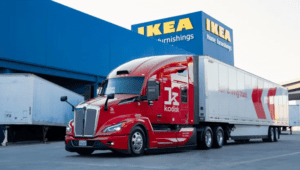 Autonomous trucks continue to make big news as more and more companies are jumping into the market. This includes autonomous trucking companies and those companies that want to partner with autonomous trucking companies. Self-driving truck startup Kodiak Robotics said that it has begun a pilot program with IKEA in Texas. A semitruck equipped with Kodiak’s autonomous driving system is making daily delivery runs from an IKEA warehouse near Houston to a store close to Dallas, roughly 300 miles away. The trucks have human safety drivers on board, but they’re being driven by Kodiak’s autonomous-driving system. Kodiak CEO Don Burnette said that these trucks are not about replacing drivers; instead, they want to make life easier for truck drivers. “Adopting autonomous trucking technology can improve drivers’ quality of life by focusing on the local driving jobs most prefer to do,” Burnette said. “Together [with IKEA] we can enhance safety, improve working conditions for drivers, and create a more sustainable freight transportation system.”
Autonomous trucks continue to make big news as more and more companies are jumping into the market. This includes autonomous trucking companies and those companies that want to partner with autonomous trucking companies. Self-driving truck startup Kodiak Robotics said that it has begun a pilot program with IKEA in Texas. A semitruck equipped with Kodiak’s autonomous driving system is making daily delivery runs from an IKEA warehouse near Houston to a store close to Dallas, roughly 300 miles away. The trucks have human safety drivers on board, but they’re being driven by Kodiak’s autonomous-driving system. Kodiak CEO Don Burnette said that these trucks are not about replacing drivers; instead, they want to make life easier for truck drivers. “Adopting autonomous trucking technology can improve drivers’ quality of life by focusing on the local driving jobs most prefer to do,” Burnette said. “Together [with IKEA] we can enhance safety, improve working conditions for drivers, and create a more sustainable freight transportation system.”
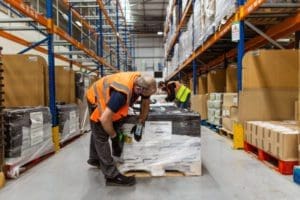 In early April, employees at an Amazon warehouse on New York’s Staten Island made history by becoming the first Amazon warehouse to vote to join a union (JFK8 fulfillment center). This begged the question of will other Amazon facilities vote to unionize as well. Earlier this week, Amazon workers in upstate New York voted against unionizing, a setback for labor activists trying to expand their unionization push at the tech company. The National Labor Relations Board said about 66 percent of employees who cast valid ballots at a company facility near Albany rejected the Amazon Labor Union. An Amazon spokeswoman said the company is glad that workers chose to keep a “direct relationship with Amazon,” which the company sees as best for employees and customers. The election at the facility, named ALB1 and located at Castleton-on-Hudson, N.Y., was the fourth this year at an Amazon warehouse.
In early April, employees at an Amazon warehouse on New York’s Staten Island made history by becoming the first Amazon warehouse to vote to join a union (JFK8 fulfillment center). This begged the question of will other Amazon facilities vote to unionize as well. Earlier this week, Amazon workers in upstate New York voted against unionizing, a setback for labor activists trying to expand their unionization push at the tech company. The National Labor Relations Board said about 66 percent of employees who cast valid ballots at a company facility near Albany rejected the Amazon Labor Union. An Amazon spokeswoman said the company is glad that workers chose to keep a “direct relationship with Amazon,” which the company sees as best for employees and customers. The election at the facility, named ALB1 and located at Castleton-on-Hudson, N.Y., was the fourth this year at an Amazon warehouse.
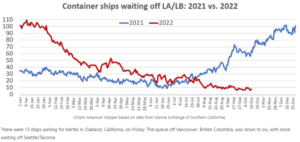 Container ships are still waiting to get space at North American ports. The good news is that there were fewer than 100 container ships stuck waiting off North American ports on Friday. The bad news is that there were still 99 container ships offshore and the pre-COVID norm was in the single digits. There’s still a long way to go to clear the backlog. But the current tally is now back to June levels and 35 percent off recent highs. The number of ships waiting off North American ports peaked at around 150 in January, with waiting vessels almost entirely off the West Coast. The queue fell through the spring as Los Angeles and Long Beach, California, improved their cargo flows. It rebounded back to over 150 in late July, propelled by traffic jams off East and Gulf Coast ports. It has gradually declined since then. According to an American Shipper survey of marine traffic ship-position data, together with the latest queue lists from California ports, there were 27 container vessels off the West Coast and 72 off the East and Gulf coasts as of the end of last week.
Container ships are still waiting to get space at North American ports. The good news is that there were fewer than 100 container ships stuck waiting off North American ports on Friday. The bad news is that there were still 99 container ships offshore and the pre-COVID norm was in the single digits. There’s still a long way to go to clear the backlog. But the current tally is now back to June levels and 35 percent off recent highs. The number of ships waiting off North American ports peaked at around 150 in January, with waiting vessels almost entirely off the West Coast. The queue fell through the spring as Los Angeles and Long Beach, California, improved their cargo flows. It rebounded back to over 150 in late July, propelled by traffic jams off East and Gulf Coast ports. It has gradually declined since then. According to an American Shipper survey of marine traffic ship-position data, together with the latest queue lists from California ports, there were 27 container vessels off the West Coast and 72 off the East and Gulf coasts as of the end of last week.
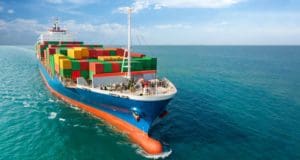 Speaking of container ships, global brands pledge to eliminate maritime emissions by 2040. Transporting goods by ship is already 40 to 70 times cleaner than shipping goods by air and significantly less expensive. Retailers are reducing their carbon footprints and saving money by shifting shipments away from air carriers to ocean carriers. They can further reduce their footprints by partnering with ocean carrier companies that are reducing their own emissions. Amazon, Ikea, Patagonia, REI and Target are among 19 global brands committed to using ships powered with zero-carbon fuels when transporting goods from oversea factories by 2040. The signatories to the Cargo Owners for Zero Emission Vessels pledge recognize that it will take extensive collaboration among carriers, ports, cargo owners and others to decarbonize the ocean transport sector. Eliminating carbon emissions from ocean shipping is one of many ways retailers are responding to climate change.
Speaking of container ships, global brands pledge to eliminate maritime emissions by 2040. Transporting goods by ship is already 40 to 70 times cleaner than shipping goods by air and significantly less expensive. Retailers are reducing their carbon footprints and saving money by shifting shipments away from air carriers to ocean carriers. They can further reduce their footprints by partnering with ocean carrier companies that are reducing their own emissions. Amazon, Ikea, Patagonia, REI and Target are among 19 global brands committed to using ships powered with zero-carbon fuels when transporting goods from oversea factories by 2040. The signatories to the Cargo Owners for Zero Emission Vessels pledge recognize that it will take extensive collaboration among carriers, ports, cargo owners and others to decarbonize the ocean transport sector. Eliminating carbon emissions from ocean shipping is one of many ways retailers are responding to climate change.
 McCormick, an American food company that manufactures, markets, and distributes spices, seasoning mixes, condiments, and other flavoring products, is taking a series of steps to help eliminate about $100 million in costs associated with inflation and demand volatility. McCormick’s move to aggressively eliminate costs comes after a year of supply chain disruptions. The company has faced sourcing constraints as a result of the war in Ukraine, higher material and transportation costs, and consumers’ decreased willingness to accept price increases due to inflation. Increased capacity and transportation savings are two of the six areas the CPG is focused on as part of its plan. Besides costs and transportation inefficiencies, McCormick is still working to resolve raw material and packaging supply issues.
McCormick, an American food company that manufactures, markets, and distributes spices, seasoning mixes, condiments, and other flavoring products, is taking a series of steps to help eliminate about $100 million in costs associated with inflation and demand volatility. McCormick’s move to aggressively eliminate costs comes after a year of supply chain disruptions. The company has faced sourcing constraints as a result of the war in Ukraine, higher material and transportation costs, and consumers’ decreased willingness to accept price increases due to inflation. Increased capacity and transportation savings are two of the six areas the CPG is focused on as part of its plan. Besides costs and transportation inefficiencies, McCormick is still working to resolve raw material and packaging supply issues.
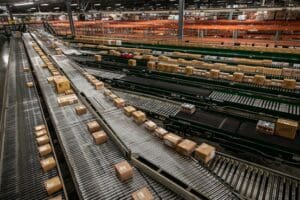 Customer expectations for fast deliveries have put more pressure on retailers in the last few years. This has fueled demand for near-airport warehouses and forced tenants to pay substantial rent premiums compared to other industrial spaces in large metropolitan areas, according to a new report from CBRE. The Dallas-based commercial real estate services and investment firm found that average rents for warehouses within a 5-mile radius of major airports are 18.8 percent higher than the average for the region. The analysis covered the 20 busiest U.S. airports for airfreight. Warehouses in close proximity to major airports are attractive to shippers needing to use the speed of airfreight to transport pharmaceuticals, jewelry, machinery, automotive components and other expensive goods. The supply of warehouses is limited in many densely populated airport submarkets that lack developable land, like those around John F. Kennedy International Airport in New York, Los Angeles International Airport (LAX) and Miami International Airport.
Customer expectations for fast deliveries have put more pressure on retailers in the last few years. This has fueled demand for near-airport warehouses and forced tenants to pay substantial rent premiums compared to other industrial spaces in large metropolitan areas, according to a new report from CBRE. The Dallas-based commercial real estate services and investment firm found that average rents for warehouses within a 5-mile radius of major airports are 18.8 percent higher than the average for the region. The analysis covered the 20 busiest U.S. airports for airfreight. Warehouses in close proximity to major airports are attractive to shippers needing to use the speed of airfreight to transport pharmaceuticals, jewelry, machinery, automotive components and other expensive goods. The supply of warehouses is limited in many densely populated airport submarkets that lack developable land, like those around John F. Kennedy International Airport in New York, Los Angeles International Airport (LAX) and Miami International Airport.
 The Federal Motor Carrier Safety Administration quietly let lapse a national hours-of-service exemption in place for over two years, a move supported by both major trucking companies and truck safety advocates. The exemption, first issued by FMCSA in March 2020 following the national emergency declared by President Trump in response to COVID-19, was extended and/or modified over 10 times. It gave truck drivers and carriers more flexibility to deliver shipments of livestock, medical supplies, vaccines, groceries, and diesel fuel by waiving hours of service restrictions. But the most recent extension, which was issued in September and expired on Saturday, has not been renewed. The change countered a decision on Friday by the U.S. Department of Health and Human Services, which renewed its determination that a public health emergency still exists. But according to the FMCSA, “the tools we have [to provide regulatory relief] are limited to the authorities that we have and based on the feedback we received we feel like we made the right call.”
The Federal Motor Carrier Safety Administration quietly let lapse a national hours-of-service exemption in place for over two years, a move supported by both major trucking companies and truck safety advocates. The exemption, first issued by FMCSA in March 2020 following the national emergency declared by President Trump in response to COVID-19, was extended and/or modified over 10 times. It gave truck drivers and carriers more flexibility to deliver shipments of livestock, medical supplies, vaccines, groceries, and diesel fuel by waiving hours of service restrictions. But the most recent extension, which was issued in September and expired on Saturday, has not been renewed. The change countered a decision on Friday by the U.S. Department of Health and Human Services, which renewed its determination that a public health emergency still exists. But according to the FMCSA, “the tools we have [to provide regulatory relief] are limited to the authorities that we have and based on the feedback we received we feel like we made the right call.”
That’s all for this week. Enjoy the weekend and the song of the week, War Pigs, which happens to be my favorite Black Sabbath song, with AI illustrating every lyric.

















